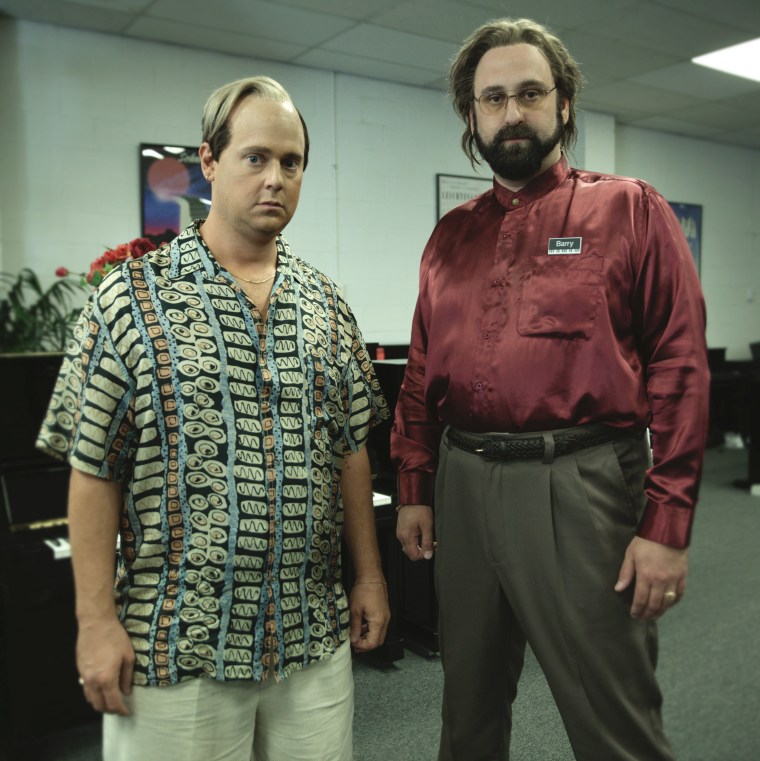 Adult Swim
Adult Swim
The second season of weirdo veteran comedy duo Tim and Eric’s Bedtime Stories premieres this Sunday night. The first episode, “Baklava,” is a super creepy tale of a piano salesman whose boss repeatedly prevents him from making a sale due to his deathly obsession with titular Mediterranean dessert. It’s the kind of plot only the warped minds of Tim and Eric could produce; the pair’s freaky ability to channel ordinary anxieties into goofy, yet chilling 20-minute episodes is what makes their aesthetic so unique and special.
Over the phone last week, Tim and Eric explained where the comically banal psychological horror of Bedtime Stories stems from, and exactly why it makes you feel so weird inside.
OK, so I really need to ask you about the first episode of this season, “Baklava.” Does one of you have a special relationship with baklava?
ERIC WAREHEIM: When we were writing the show, we would eat at this Middle Eastern restaurant. We needed another story, and we were brainstorming from scratch. Tim was eating a piece of baklava, and he just started going, “Baklava.” And I started going "baaaklavaah" and we were saying it over and over and thought, What if we wrote a story about a guy obsessed with baklava? And within that hour lunch we wrote the whole damn script.
What is it about the horror genre that appeals to you?
TIM HEIDECKER: I don’t know if [Bedtime Stories] is like “horror” in the gory sense, but more that uncomfortable, scary, neurotic thing that doesn’t necessarily have to be gory or campy. We’re trying to tap into real nightmare experiences, more like Polanski and Kubrick than slasher-style. We like tapping into our fears, and finding ways to tell stories that are scary but perhaps human, too.
What’s the scariest thing that’s ever happened to you?
TIM: I was stabbed in the back by a neighbor. That was probably the scariest thing that’s ever happened to me. Nearly bled to death in a gay bar in Silverlake. It's a well-documented story from my career/personal life. The details of which can be found… on the internet!
ERIC: I had this dream that relates to the first episode of the first season — the “Hole” episode where I get buried alive with Tim, my family, my wife, and my kids. I had this dream a couple years ago that was one of those dreams you can’t shake for like a month. My girlfriend was cheating on me, she was doing heroin, my family denounced me, my sister wouldn’t talk to me, I beat up Tim, all in that dream. It was such a scary thing to wake up to. We had to write that feeling into a show.
What is your worst fear —your nightmare situation?
TIM: I have kids, so the biggest fear that I have every single day is something happening to them. I’d say once a day I have a nauseous panic attack about getting a phone call, or doing something accidental. That’s the thing that will never go away, until I’m dead. It’d just be such a bummer to start over again with kids, you know.
Are there any shows or movies that particularly influenced Bedtime Stories? You’ve previously referred to The Twilight Zone, for example.
ERIC: I’m more of a fan of guys like Lars von Trier lately. He does very similar nightmarish drama horrors. His stuff is great.
TIM: The Twilight Zone was a good reference for us — when we were pitching it we were saying, “It’ll be kind of like The Twilight Zone, in that it will be a different story every week.” It doesn’t tend to be so moralistic, or science-fiction-y, but it was a way to be like, “Remember The Twilight Zone? This is kinda like that.”
 Adult Swim
Adult Swim
“Bedtime Stories is a product of us feeling the weight of the world in a heavier way.” —ERIC WAREHEIM
Why did you decide to go in such a dark direction with Bedtime Stories?
TIM: We knew we wanted to do something in the opposite scale of Awesome Show, something with bigger production value, more story-oriented. But we liked the ability to not be trapped in one world, one environment. Adult Swim is the best place [for that] because they’re open to alternative formats. We didn’t really know what it was gonna be when we first started making it. We were like, Oh, some will be really silly, and some will be weird and dark. And once we started making it we just were attracted to the darker stories, and that’s the direction Season 2 went in.
Do you feel your work is informed by the current apocalyptic-feeling state of the world?
ERIC: Yeah, I mean, look what’s happening in America with the political situation, and Mother Earth. Bedtime Stories isn’t much scarier than the craziness you read on the news everyday. I think the Tim and Eric work has always reflected our perspective of culture — for 20 years. And as we get older, things settle in. Your anxieties build as you get older. Bedtime Stories is a product of us feeling the weight of the world in a heavier way; the only way we can express ourselves is by writing these scripts that have these very intense motifs — suicide, obsession; in one episode [of Season 2], the husband of the wife turns into the son of the wife. Nightmares like that, that you almost can’t explain because they’re so horrific. I see those things in my daily life now, and we’re reflecting that into this series.
TIM: What I love about the show is it’s always about a relationship. It’s always Eric and I or a couple different characters. It’s usually about how people behave around each other. “Baklava” is a very simple character dynamic: an annoying guy is preventing Eric from doing what he needs to do. The relationships between these people is always at the heart of the stories.
Is it cathartic for you to write them?
ERIC: I feel like we have to go to a really dark place and a super silly place to make these things. And right now we’re in the middle of color-correcting, sound design, etc. The feeling of getting through that nightmare and seeing it all finished is a really cathartic experience.
TIM: When Eric and I were sitting at that Middle Eastern place, we were like, “We think this is funny, we think this is interesting, we think this small little moment is really funny.” But you never really know. We just trust our guts. And then to put a bunch of money behind it and a bunch of people to work doing it, and seeing it through and seeing it all come together — we were lucky enough to screen [“Baklava”] on our tour and see it connect. It felt like, I’m glad we did that.
